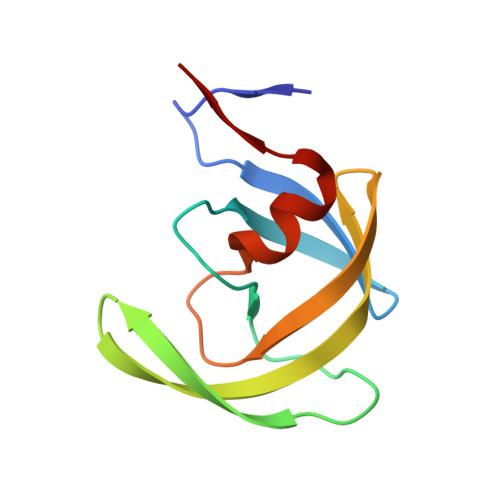Extreme Entropy-Enthalpy Compensation in a Drug-Resistant Variant of HIV-1 Protease.
King, N.M., Prabu-Jeyabalan, M., Bandaranayake, R.M., Nalam, M.N., Nalivaika, E.A., Ozen, A., Yilmaz, N.K., Schiffer, C.A.(2012) ACS Chem Biol 7: 1536-1546
- PubMed: 22712830
- DOI: https://doi.org/10.1021/cb300191k
- Primary Citation of Related Structures:
3EKP, 3EKQ, 3EKT, 3EKV, 3EKW, 3EKX, 3EKY, 3EL0, 3EL1, 3EL4, 3EL5, 3EL9 - PubMed Abstract:
The development of HIV-1 protease inhibitors has been the historic paradigm of rational structure-based drug design, where structural and thermodynamic analyses have assisted in the discovery of novel inhibitors. While the total enthalpy and entropy change upon binding determine the affinity, often the thermodynamics are considered in terms of inhibitor properties only. In the current study, profound changes are observed in the binding thermodynamics of a drug-resistant variant compared to wild-type HIV-1 protease, irrespective of the inhibitor bound. This variant (Flap+) has a combination of flap and active site mutations and exhibits extremely large entropy-enthalpy compensation compared to wild-type protease, 5-15 kcal/mol, while losing only 1-3 kcal/mol in total binding free energy for any of six FDA-approved inhibitors. Although entropy-enthalpy compensation has been previously observed for a variety of systems, never have changes of this magnitude been reported. The co-crystal structures of Flap+ protease with four of the inhibitors were determined and compared with complexes of both the wild-type protease and another drug-resistant variant that does not exhibit this energetic compensation. Structural changes conserved across the Flap+ complexes, which are more pronounced for the flaps covering the active site, likely contribute to the thermodynamic compensation. The finding that drug-resistant mutations can profoundly modulate the relative thermodynamic properties of a therapeutic target independent of the inhibitor presents a new challenge for rational drug design.
- Department of Biochemistry and Molecular Pharmacology, University of Massachusetts Medical School, 364 Plantation Street, Worcester, MA 01605, USA.
Organizational Affiliation:



















